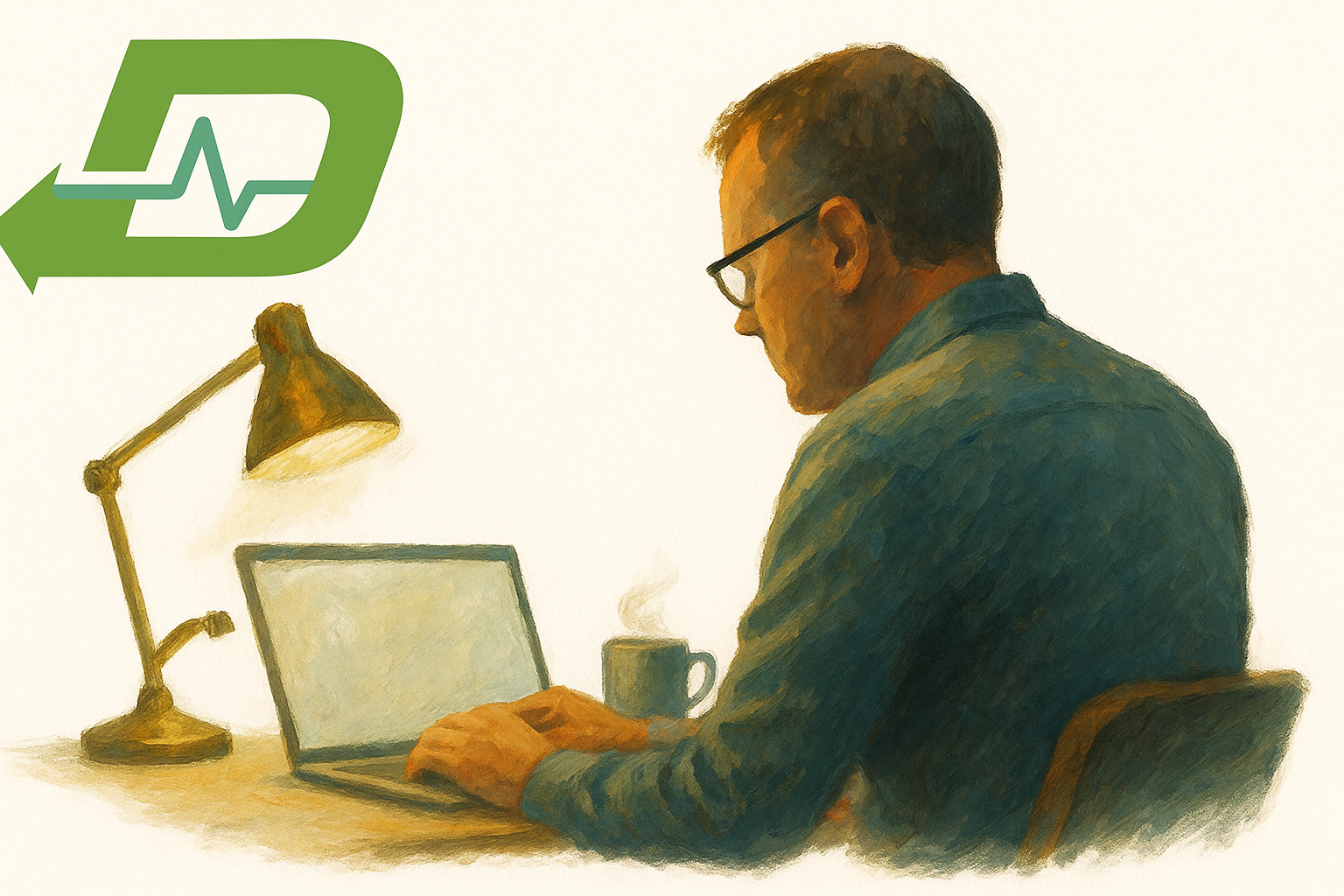Estimated reading time: 16 minutes
You can listen to this article — The Sunday Blues: A Weekly Ache in the Soul of Modern Life — narrated in full. Whether you’re walking, driving, or just prefer to hear it aloud, click play below
I didn’t plan to write about the Sunday Blues.
But while recently referencing Viktor Frankl, the Austrian neurologist, psychiatrist, and Holocaust survivor, I came across a line that stopped me:
“Sunday neurosis… the kind of depression which afflicts people who become aware of the lack of content in their lives when the rush of the busy week is over.”
— Man’s Search for Meaning
There it was. The feeling we now casually label the “Sunday Scaries”—long before it became a trend or a marketing hook. It wasn’t just about the approach to work. It was about what surfaced when the noise stopped.
That led me down a trail. Through history, psychology, literature, work culture—and, let’s be fair, a few familiar footsteps of my own.
Me and the Sunday Blues? We go way back. That vague unease that arrives as the weekend exhales—not panic, not drama, just a soft sense of something missing. Time off doesn’t feel restful, and it’s not that Monday is frightening. It’s more like a quiet question stirs: What’s the point? Not in a dramatic sense—just a flicker of disconnection, a moment where routine returns before meaning does.
And maybe it’s also this: You know exactly what Monday holds—its meetings, its momentum, its familiar pace.
But your soul isn’t quite packed for the journey. It lingers behind, still barefoot in the quiet.
Because the Sunday Blues aren’t new. They’ve been with us for centuries. Only the shape has shifted—from guilt to exhaustion, from existential drift to digital overload. They reflect something fundamental, not just about work, but about how we utilize our time, what gives us purpose, and how we respond when routine is disrupted.
The article is about that feeling. Its origins, its meaning, and why it still lingers—and deserves more than a shrug.
Guilt Before God: The Puritan Origins of the Sunday Blues
Long before digital reminders and unread messages, Sunday already carried a strange emotional weight.
In 17th- to 19th-century Protestant and Puritan societies—particularly in England and colonial America—the Sabbath wasn’t a gentle pause. It was a moral checkpoint.
Games? Forbidden. Travel? Discouraged. Laughter? Suspicious. The goal wasn’t relaxation. It was obedience.
Church attendance was mandatory. So were reflection, repentance, and a healthy dose of spiritual discomfort. Diaries from the time describe Sundays not as peaceful, but oppressive.
“Sunday passed in usual wearisome solemnity. I longed for Monday.”
— Boston diary entry, 1847
This wasn’t just about routine—it was about righteousness. If you didn’t feel spiritually uplifted, the assumption was that something was wrong with you. Your soul was out of alignment.
In Puritan theology, emotional states were considered important. Joy, humility, conviction—these weren’t just feelings; they were evidence. A restless or unfulfilled Sunday suggested not boredom, but moral deficiency.
The result? A weekly dose of unease, disguised as devotion.
Even after laws enforcing strict Sabbatarianism faded, the cultural residue lingered. In many Western countries, Sunday remained tinged with guilt—a day meant for goodness, not enjoyment—a time to reflect, repent, and resist pleasure. And if you didn’t feel rested by Sunday night, well… maybe you weren’t doing it right.
Sunday already felt different—quiet, serious, with a hint of guilt. Not quite the “Sunday Scaries” yet, but the mood was set.
Sunday: the Day Everyone Pretended to Rest
By the mid-1800s, the workweek had hardened into six days of labor and one day of sanctioned rest. But for the working class, that “rest” often felt more like a held breath. Sunday was a narrow window—just wide enough to remember you were human, but not long enough to feel free.
Factory workers in Europe and the U.S. spent Sundays sore and depleted. The morning might begin with chapel bells echoing down soot-streaked streets, calling men and boys—some still flecked with coal dust—to fill pews in wool suits worn thin.
Lunch meant boiled potatoes or scraps of meat, then came chores, mending, child-rearing, or simply enduring the silence. Some drank. Some sat in exhausted quiet. By sundown, the air grew heavier—not from soot, but from the creeping knowledge that Monday was already reclaiming them.
“There was no time to rest. Sunday was the day you tried to remember who you were. But by evening, you were already back in the mill.”
— Textile worker, Manchester, 1873
The phrase “Blue Monday” emerged during this era, describing the absenteeism and hangovers that followed the one day workers were given to collapse or cope. But the emotional hangover began earlier—on Sunday night—when the body stopped moving and the dread crept in.
But the Sunday Blues weren’t limited to those who labored.
In upper-class households, Sunday took on a different kind of weight—lighter on the body, heavier on the soul. It was a day of silence, decorum, and stillness masquerading as grace. Breakfast was eaten quietly, followed by church, then a roast lunch served on porcelain by servants. After that, time thickened.
You could not read novels. You could not play games. Children were dressed neatly and told to sit still with acceptable books. Their parents sat in drawing rooms scented with polish and rosewater, making slow conversation or none at all. The fireplace was lit, whether or not it was needed. The only sound was the ticking of the longcase clock—and the sense that the day was stretching out, far longer than it had any right to.
As one aristocratic diarist put it, “Not for lack of comfort, but for lack of movement. One felt a little trapped in the drawing room.”
For the working class, Sunday was a short gasp between shifts. For the upper class, it was a velvet-lined cage—beautiful, proper, but quietly oppressive. In both cases, Sunday wasn’t a relief. It was a reckoning.
For some, the ache doesn’t wait until sunset. It begins with the first quiet hours of Sunday morning, when the stillness is already too loud.
But what happens when the factory noise fades, the hours improve, and Sunday still feels wrong?
Melancholy in the Middle Class
The factories quieted. The hours shortened. The streets widened. But the Sunday Blues remained.
By the mid-20th century—especially in postwar America and Britain—Sunday had moved to the suburbs. The grime of industrial labor gave way to manicured lawns, split-level homes, and neatly trimmed hedges. Material life had improved, at least on the surface. But comfort didn’t erase unease. It just dulled its edges.
Gone were the coal mines and textile mills. In their place came roast dinners, televised sports, and long, idle afternoons. But something lingered—a quiet disconnection, a lack of fulfillment. Not hardship. Just a flatness, an absence of inner movement
Writers noticed. John Cheever, a novelist often called the Chekhov of the suburbs, called it “that familiar Sunday afternoon melancholy.” Sylvia Plath described Sundays as “gray,” “numbing,” and “stillborn.” Joan Didion, never one to miss a crack in the façade, wrote of “the peculiarly passive sadness of Sunday afternoons.”
In the postwar domestic order, Sunday came with a dress code and a to-do list disguised as leisure. Men performed relaxation by mowing the lawn or scanning the paper. Women orchestrated calm while roasting meat and wiping counters. Children were either muted indoors or exiled outside, preferably out of sight. Everything looked just right—blazers, pearls, fixed smiles. The afternoon followed the usual choreography: roast beef, passive-aggressive silence, and a TV murmuring in the background. Scotch for him, Virginia Slims for her. Not exactly joy. More like maintenance.
It wasn’t chaos or crisis—just soft restlessness wrapped in routine.
And then came the Monday feeling.
It arrived before dusk. School bags packed. Alarms checked. Calendars scanned. Nobody said they feared Monday—it would’ve sounded dramatic. But the laughter thinned. The air cooled. Somewhere between the dishes and the weather report, a quiet dread set in.
Monday meant re-entry. Into offices, small talk, and fluorescent lighting. Into a life that, while safe, often felt like something to perform. Sunday was the rehearsal. Monday, opening night.
And as the curtain loomed, people found ways to cope. Distraction. Ritual. Escape. Not to fix the feeling—but to delay it. To buy a few more hours of not-yet.
Rituals of Escape
Weekends are supposed to save us. That’s the deal. Work takes, and Saturday gives back. Sunday, in theory, restores. The modern week is built around this promise: two days carved out for pleasure, freedom, maybe even rest.
But by Sunday evening, the promise often feels broken.
So we try to outrun the feeling. We fill the time—dinners, errands, cleaning, yoga, screen time, long walks, short naps, longer scrolls. We manufacture momentum.
At the core of the Sunday Blues is restlessness—not just dread, but a low-grade agitation. You pace, scroll, and half-start things. You feel the need to do something, without knowing what. The body has time off, but the mind can’t settle.
It becomes a kind of anticipatory anxiety, even existential discomfort. As Viktor Frankl put it, it’s what surfaces when the noise fades and meaning feels just out of reach.
That inner friction explains why even our comfort rituals—movies, meal prep, a drink—can backfire. Distraction doesn’t soothe the ache. It just delays it.
And perhaps no ritual is as common—or as quietly loaded—as the weekend drink.
Friday is the exhale. Saturday, the high point. Drinks with friends, loud music, easy laughter. Not just unwinding—but proving something. That you’re still spontaneous. That you still feel.
By Sunday, the buzz is gone. The house is quiet. The questions creep in.
If there’s a hangover, it’s not just physical. It’s emotional. The contrast is sharp: noise to silence, company to solitude. Alcohol, once a buffer, becomes an amplifier—just slow enough to let the doubts slip in.
We want the weekend to redeem the week. When it doesn’t—when it feels flat or wasted—regret creeps in. Not guilt, exactly. Just a throb of disappointment: that time meant for joy became another box to check.
Even rest becomes a performance.
And when Monday looms, the Sunday Blues arrive not just with dread, but with a sense of failure. Like you had a shot at happiness—and missed.
As writer Chuck Klosterman once put it, “Sunday: a hangover without the alcohol.”
It’s not always about the drinks. It’s the comedown from expectation—the ache that rises when freedom doesn’t feel free, when meaning doesn’t quite land. You’re not sick, just… unsettled. A little tired. A little haunted.
And maybe that’s what the Sunday Blues are—a weekly reckoning. Not dramatic. Just a low hum that says: something’s missing.
What if the problem isn’t the weekend? What if the real issue is expecting two days to fix everything?
The Sunday Blues don’t just whisper that Monday is coming. They reveal something deeper: if your life feels off-track, no weekend ritual can set it right. And sometimes, the things we use to numb the ache—alcohol, distraction, dopamine—only deepen it.
Not because we’re weak. But because the feeling we’re avoiding might be worth listening to.
Which brings us to the next escape hatch—not the wine glass, but the phone in your hand.
The Branded Scaries: When Sunday Became a Product
If the Puritans moralized Sunday and the factories weaponized it, then the 21st century did something stranger: it packaged it.
Sunday was once a quiet melancholy. Now, it has a marketing team.
The feeling we used to sit with—uneasy, wordless, private—has been rebranded as the Sunday Scaries. It’s got hashtags. TikTok. Meme formats. There are scented candles for it. Brunch cocktails are named after it. You can buy a hoodie that says “I Have the Sunday Scaries,” and it’ll arrive by next Sunday—right on time.
But the anxiety itself? Still very real.
According to recent surveys, nearly three out of four professionals report feeling anticipatory stress on Sunday evenings. And it’s not just about job performance. It’s about blurred boundaries—when work lives in your inbox, your wristwatch, and your bedside table.
There was a time when Sunday night meant ironing shirts and setting alarm clocks. Now it means replying to emails that somehow don’t care it’s the weekend, checking work messages “just in case,” and lying in bed doomscrolling through curated weekends you didn’t have.
In the age of remote work and constant connectivity, Sunday no longer marks the end of rest. It marks the failure to have rested properly.
“I know that dread. It creeps in with the evening light.”
— Nick Offerman, LinkedIn News, 2023
Even self-care has been absorbed into the Sunday economy. Influencers prescribe bubble baths and lavender oils while quietly implying that if you still feel anxious, you’re doing Sunday wrong. The pressure to relax becomes another form of performance.
Sunday, once a quiet day of rest or reflection, has become a carefully managed operation. And that’s most obvious in the way we talk about it—using therapy buzzwords, dressing it up as productivity, or turning it into a trendy ‘wellness challenge’ to be conquered.
So, the packaging is new.
You’re expected to recharge, reflect, reset, and meal-prep, all before your first morning check-in or calendar alert.
The old dread was subtle. This one sends notifications.
Clinical Recognition: When Sunday Got a Diagnosis
You won’t find it in any medical textbook. There’s no billing code. But the Sunday Blues are real enough to show up in therapy sessions, brain scans, and the waiting room on Sunday night.
Psychologists often describe it as a form of anticipatory anxiety—a stress response triggered not by a present danger, but by something coming: deadlines, decisions, commutes, responsibilities, or just the psychological shift from freedom to obligation.
Dr. Jack Nitschke, a clinical psychologist and neuroscientist, has found that this kind of anxiety activates the same brain regions as fear of uncertainty. It’s not about what will happen on Monday. It’s about what might—the ambiguity of emails, the potential conflict in a meeting, the vague feeling that you’re already behind.
The result? Elevated cortisol. Restlessness. Stomach issues. Mood swings. Difficulty sleeping. Not enough to call in sick—but enough to rob Sunday of its stillness.
For some, it goes deeper.
Dr. Suzanne Degges-White, a counselor and professor at Northern Illinois University, sees the Sunday Blues as a clash between identity and expectation. You spend the weekend closer to who you are. Then Sunday reminds you who you’re expected to be.
It’s not just “I don’t want to go to work.” It’s: “Is this really what I’m supposed to be doing with my life?”
Viktor Frankl’s insight reframes the Sunday Blues entirely. It’s not about exhaustion or fragility—it’s about a vacuum of meaning. When the noise of the week fades, what’s left can feel unsettlingly empty. He described this as “Sunday neurosis,” a kind of quiet despair that surfaces not from overwork, but from underpurpose. The body may be rested, but the soul feels unanchored.
And because we’ve blurred the edges between work and life, the tension no longer resolves. There’s no clean break between Sunday and Monday. You’re always half-on, half-preparing, half-pretending. It’s no wonder Sunday starts to feel less like rest and more like a slow return to self-erasure.
Even if you like your job, even if you’re good at it, the Sunday Blues don’t always signal something wrong. Sometimes they signal something real—a mismatch between how we spend our time and how we want to feel.
And long before psychology named it, artists, writers, and musicians were already trying to describe it—in novels, in lyrics, in quiet scenes of ordinary dread.
Cultural Echoes: When Art Got There First
Long before therapy framed it and culture turned it into commentary, the Sunday Blues had a presence in art. In novels, songs, paintings, and comedy sketches—it was all there, unnamed but deeply familiar.
Artists may not have diagnosed it, but they felt it, sketched it, sang about it.
In the novel, Dancer from the Dance (1978), Andrew Holleran captured the fog of Sunday melancholy drifting through New York’s gay subculture, not born of shame or sin. Still, of disconnection: the weekend ecstasy fading, Monday looming, the party lights turned off too soon.
John Cheever, in his journals, repeatedly circled back to what he called the “Sunday afternoon despondency.” Not depression. Not grief. Just that slight falling away of purpose, of clarity, of certainty.
In The Bell Jar, Sylvia Plath described Sunday as “gray,” “numbing,” and “hollow.” For her, Sunday wasn’t restful—it was witness—a day when your performance of normalcy had to be convincing, even though no one was watching.
This mood wasn’t just literary.
In music, it’s there too—Frank Sinatra’s “Sunday kind of love” swings between longing and loneliness. Billie Holiday’s phrasing turns even joy into something bruised. And in more recent decades, everyone from The Cure to Mitski to Arctic Monkeys has written their own version of the Sunday slide—that slow drift from warmth into weight.
Even New York, in all its noise and charm, couldn’t escape it:
“New York on Sunday, big city takin’ a nap / Slow down, it’s Sunday—life’s a ball, let it fall in your lap.”
— Peter Nero, New York on Sunday, 1961
The tempo says ease. But the lyrics? They’re just shy of ironic. As if even the city’s nap is scheduled, curated, and fragile.
Even in Japan, there’s a name for it: “Sunday neurosis.” A culturally recognized mild depressive state that kicks in as the weekend ends. As early as the 1990s, Japanese psychologists were noting that workers—especially men—showed signs of withdrawal and anxiety every Sunday night.
This was no longer about survival—it was about the quiet toll of stability.
The Takeaway: Sunday as a Mirror
We talk about the Sunday Blues like they’re a glitch in the system. A mood. A running joke. But maybe they’re not a bug—they’re a signal. A mirror reflecting not just the end of a weekend, but the shape of the life it’s interrupting.
It’s not always about dreading Monday or hating your job. Sometimes it’s about something subtler: the quiet realization that your time off doesn’t feel like freedom. That what you’re returning to doesn’t quite fit. That, for all the checklists and calendars, something essential is missing.
And no, it’s not fixed by a productivity hack. Or a fresh planner. Or an inspirational quote about “crushing the week.” The Sunday Blues don’t need optimization. They need attention.
Because they’ve been with us for centuries. Through piety, productivity, and performance. From Puritan guilt to suburban dread to digital overwhelm. The details change. The feeling doesn’t.
Even if your rational brain says everything is fine—your job is stable, your calendar full, your obligations met—your body may be sending a different signal: tension, fatigue, unease. It’s a reminder that checking off boxes isn’t the same as feeling fulfilled.
In Viktor Frankl’s terms, it’s not a lack of stamina—it’s a lack of meaning. A deeper disconnection.
So maybe the Sunday Blues aren’t a flaw. Maybe they’re wisdom. And if they deepen—if the unease grows heavy, persistent, or begins to erode your ability to enjoy anything at all—that’s a line worth paying attention to. Because the Sunday Blues, left unchecked, can bleed into something deeper: a burnout that won’t fade by Monday, or a depression that doesn’t need a calendar cue.
So if Sunday feels heavy, don’t rush to fix it. Sit with it. Listen. It might not be anxiety. It might be insight—arriving right on schedule.
📚 Sources & Further Reading
- Frankl, Viktor E. Man’s Search for Meaning. Beacon Press, 2006.
- Degges-White, Suzanne. “Sunday Syndrome: Mourning the Weekend That Got Away,” Psychology Today, 2015. Link
- Phyllis Chua, Michael Krams, Ivan Toni, Richard Passingham, Raymond Dolan. A Functional Anatomy of Anticipatory Anxiety. NeuroImage,Volume 9, Issue 6, 1999,Pages 563-571. Link
- Cheever, John. The Journals of John Cheever. Vintage, 1991.
- Plath, Sylvia. The Bell Jar. Harper & Row, 1971.
- Holleran, Andrew. Dancer from the Dance. William Morrow, 1978.
- Weber, Max. The Protestant Ethic and the Spirit of Capitalism. Routledge, 2001.
- Solberg, WU. “The Puritan Sabbath and the Making of American Time.” American Literary History, 1966
- Nero, Peter. “New York on Sunday.” Columbia Records, 1961.
- Offerman, Nick. Comment via LinkedIn News, 2023.
- The Cure, Mitski, Arctic Monkeys — lyrical references to Sunday melancholy in modern music.
This article was written by me with editorial assistance from ChatGPT, which supported research, phrasing, and structure.




Great article, I really relate to the feeling. Gearing up for the coming week, confronting vanity, and trying to find meaning in the daily grind. A higher purpose and responsibility through one’s work.
Nice article. I like the part of your time off doesn’t feel like freedom. In my case, I feel like I have to simplify my life to gain my “me” time back. I love modern technology, but it seems to have vanished all of my free time. After reading friends emails, phone messages, looking at my favorite internet sites, social obligations, and phone calls, I feel like all my weekend time has vanished. I remember living in the pre-internet days, when I got off of work Friday night, I had 2 full weekend days to do whatever I wanted. I was happier then.
Also, as a mirror of life. I was at one time an investment adviser, and a terrible tragedy is seeing people work lots of hours at a job they didn’t like so they could one day retire and enjoy life to the fullest. The sad thing is that when those people retired, they wasted the best part of their life, and now don’t have the health and energy that they once had to do the things they always dreamed of. Whether someone makes a lot of money, or a little money, having a satisfying or enjoyable career is one of the best decisions in life.
Thanks for sharing this, Andy. Sorry for my late reply – much of what you said rings true. It’s strange how all the tools meant to save us time somehow ended up eating it instead. That feeling of weekends slipping away to emails, messages, and obligations—I know it well. There used to be space for boredom, rest, even spontaneity. Now, it feels like you have to fight for that space.
And your reflection about retirement really struck a chord. I’ve seen it too—people spending decades in jobs they don’t enjoy, hoping to finally live on their own terms one day, only to find they no longer have the health or energy for it. It’s a quiet kind of heartbreak.
You’re right: whatever we do, finding some sense of meaning or satisfaction in the work itself makes all the difference. I really appreciate your note.
Best,
Axel